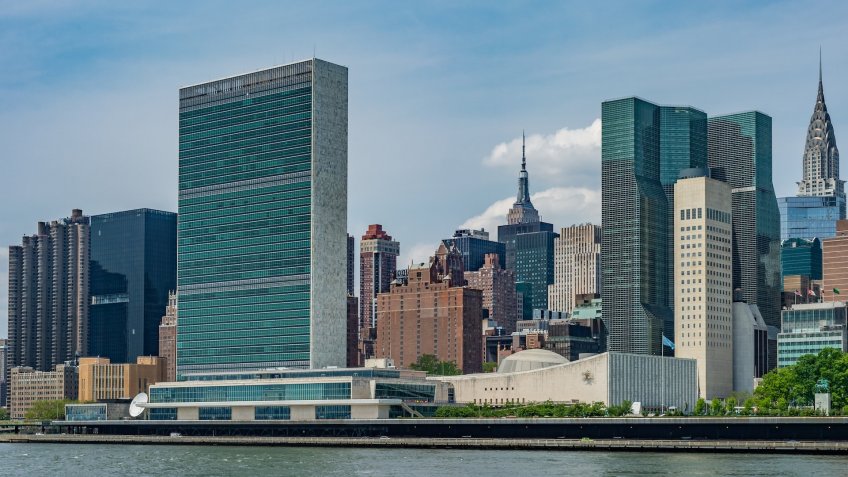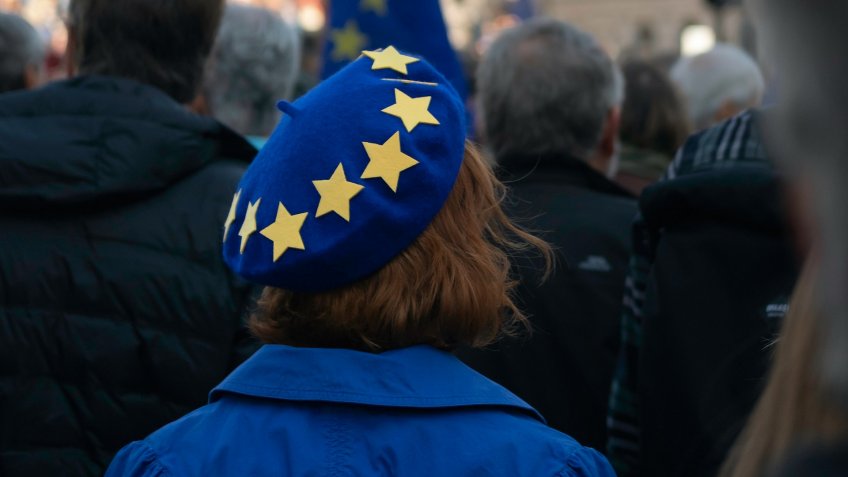
The dynamics of events on the world stage today are characterized by the ongoing polarization and disintegration of the fabric of international cooperation. The relevant processes have been initiated by Western countries as part of a hybrid (including sanctions and economic) war against Russia, launched clearly without a sober assessment of the situation and the prospects for its outcome. The course to inflict a "strategic defeat" on Moscow has already led to a break in logistical chains, degradation of globalization processes and transformation of the "great power rivalry" into a full-fledged "cold war", with the risks of nuclear escalation and direct armed conflict between Russia and NATO.
The situation is complicated by the dependence of the position of Western elites on domestic political turbulence in both the United States and Europe, against the background of worsening socio-economic problems. Using the Ukrainian crisis as a means of solving electoral problems and rallying allies, the Biden administration and the forces aligned with it have bet on the depletion of Russia's military and economic potential. They see what is happening as a means of restoring the unipolar world order and maintaining their global dominance, which is directly threatened by Russia's sovereign and independent policies. Moreover, this time Russia is challenged not only by the traditional military-political challenge, but also by a threat on the level of identity and history, which predetermines the existential nature of the current conflict.
At the instigation of the West, attempts to form a global agenda have practically lost their relevance. We can say that it has collapsed. The abandonment of interaction with Russia on key issues such as arms control and nuclear nonproliferation, the prevention of the militarization of space and cyberspace, countering global warming, the fight against poverty and inequality, the maintenance of food security and many others has affected the effectiveness of international cooperation in finding collective responses to new challenges and threats, to say the least, it has become more difficult. In fact, even the preconditions for the formation of unified approaches have disappeared. At the same time, there are no prerequisites for the formation of some alternative institutions that could form the basis of a more effective system of world order. So far, the West has made a major step towards its self-isolation from the entire non-western world, initiating the formation of the World Majority, including Russia, China and India, as the opposite and alternative pole of the world development.
Regional security systems, particularly in Europe and Asia, are rapidly deteriorating. The existing European security architecture, due to its natocentricity and the West's refusal to compromise with Moscow, has practically ceased to exist since the Ukrainian crisis worsened. All the frozen conflicts, from Cyprus to Kosovo, are at risk of reactivation, while the international community has no tools, already insufficiently effective, to maintain control over the situation. In Asia, Washington's network of anti-Chinese alliances raises the prospect of a full-fledged arms race and a growing artificially provoked confrontation between regional powers.
The growing polarization and blocization in international affairs have dealt a blow to the existence of a unified information and economic space. Rapid compartmentalization of the Internet is being observed. There is a demand for regional trade and economic unions against the background of the collapse of the foundations of the Bretton Woods system. Against the background of an obvious civilizational split, the tools of "soft power" of the West have shown their ineffectiveness, which risked using interdependence as a weapon with disastrous consequences for itself. As a consequence there is a destabilization and disintegration of the global world into regional clusters, which serve as materials for building a new world order on a polycentric basis, reflecting the cultural and civilizational diversity of the world (including Russia as a state of civilization), which was suppressed by Western domination for centuries.
All this suggests that humanity is again experiencing a turning point in its development, the outcome of which will predetermine, including the horizons of international relations and the world order by the turn of 2030, and most likely, the processes of world reconstruction will be delayed for another 5-10 years. The coming years will be a period of rethinking the conceptual approaches of all international actors to what should be the system of international relations that meets the requirements of the time. There is no doubt that Western hegemony has worn out and brought the world to a standstill, no longer serving the purveyors of international "public goods". The paradigm for the further development of the system that is emerging before our eyes will be formulated largely depending on the results of the situation in Ukraine.
In all likelihood, the painful parting of the U.S. leadership role will continue, accompanied by increasing domestic turbulence in the country. Clearly, the consolidation of Western political forces in the face of an artificially imposed "Russian threat" is temporary. Numerous conflicts in both the United States and Europe have gone into latent mode, but will demand their resolution, because we are talking about a complex crisis of Western society. It is comparable with the Great Depression of the 1930s and the crisis of the late 1970s, from which a way out was found through the transition to neoliberal economic policies (Reaganomics-Tetcherism) and globalization, which subjected the postwar "social contract" to a "creeping" revision.
The West was unprepared for a protracted conflict in Ukraine, while the plan for a "hybrid blitzkrieg" against Russia failed. So far, one can observe Washington's desire to end the conflict in Ukraine by the end of this year with a negotiated settlement on its own and not acceptable to us terms: cease-fire, preservation of the current Ukraine with the current regime and ideology in a territorially preserved form with the possibility of the West continuing its militarism (but without formal NATO membership) while refusing to recognize our new borders and, therefore, discrimination against people living in our new regions; sanctions regime is supposed to remain until a final settlement The main motive behind this approach is the inability of the U.S. and its European allies to conduct a "war on two fronts," with China, not Russia, seen as a complex challenge to Western hegemony.
Accordingly, the overall construction of the geopolitical world order, which was created by Washington after the end of the Cold War and is now experiencing a systemic crisis, can hardly be reanimated. Its inherent bloc-based political thinking can only lead to a large-scale conflict of a global nature, which the main actors, including the United States and the collective West, will generally try to avoid in every possible way. This also contradicts the interests of business, which needs stability and predictability. Hence, the alternative of a more or less systemic consensus that meets the needs and approaches of the various centers of power in Eurasia, Africa and Latin America, as it happened against the background of the collapse of the colonial empires in the first half of the 20th century, seems more plausible. In general, the situation in the Russia-U.S.-China triangle will obviously have a predominant influence on the future world configuration, encouraging the United States to adopt multipolarity as a "new normal". At the same time, the U.S. course of simultaneous containment of Russia and China not only does not give Washington the desired results, but so far brings the opposite effect. What will allow to judge the hopelessness of "normalizations" of the USA and the West as a whole as another civilization and another region of the world.
And this promises, despite the strengthening of the role of the factor of military force in world politics, very uncertain prospects for the preservation of stability in the next 10-15 years. Much will depend on the rate of change of the Western elites, formed in the hothouse conditions of the "unipolar moment" of the last 30 years.
It is quite possible to predict the corrosion of the European Union system, which unites the most consistent allies of the United States, which continues to lose its subjectivity and, despite the obvious political and economic costs for itself, is sliding into unquestioning submission to the course of Washington, which uses European business, including German business, for the reindustrialization of the United States. This situation, objectively, also implies, in the long term, the possibility of strengthening centrifugal manifestations in the EU and increasing the potential for Western European countries to take protective measures to safeguard national interests. The zone of strictly U.S.-oriented EU states may gradually acquire a tendency to a gradual, consistent reduction and shift to the north and east.
It is obvious that the processes of de-globalization will continue to intensify. Factors of achieving economic, industrial, scientific, technological, monetary and financial sovereignty are becoming increasingly important for states that aspire to the role of regional leaders. At the same time, the center of gravity of foreign policy activity will inevitably shift towards the global majority - the regions of Asia, Africa and Latin America.
The international legal order created in the post-war period, with the central role of the UN and universal international legal instruments, has in fact suspended in the systemic confrontation between the West and Russia. This applies primarily to the maintenance of peace and security. In addition, major multilateral treaties and agreements aimed at preventing nuclear testing, maintaining nuclear parity, and limiting arms and dangerous military activities have terminated due to the unilateral U.S. withdrawal or suspension in response to the Russian side.
The process of transformation and reform of the Bretton Woods dollar-based monetary and financial system, which began in 1971, is moving consistently and at an accelerated pace toward diminishing the international role of the dollar and other Western currencies. The use of the dollar as a weapon is undermining the very legitimacy of the system. At the same time, there are real prospects for the formation of a multi-element system of regional currencies used in international payments, especially in the regions.
Integration associations of states located primarily in the Eurasian zone - BRICS, SCO, EAEC, APEC, and ASEAN - are making an increasingly bold bid to become a powerful economic center of power. The basis for the implementation of the Greater Eurasian Partnership concept will inevitably be strengthened by the breakdown - institutional and otherwise - of Western control.
Among the defining trends is the continued shift of the focus of global political and economic activity to the Asia-Pacific region. The combination of geopolitical processes in the Asia-Pacific region and the peculiarities of regional specifics makes it a promising platform for the transition to the new regional security architecture, adequate to the changed realities. Thus, it is fundamentally important that Asia has a well-established tradition of seeking solutions to emerging problems on an inclusive and consensual basis, within a rather unique system of "checks and balances", without the use of "foreign" external models. Integration here, unlike in Europe, is not accompanied by initial geopolitical rivalry (despite the differences in development models and so far despite attempts to "break" the specific "Asian paradigm" from outside).
There are enough sober forces in the Asia-Pacific region who adhere to a system of views according to which the imposition of artificial formulas of "order" from the outside, leading to a split in regional life, is categorically unacceptable. Therefore, one of the scenarios for extrapolating this trend is a healthy consolidation of these forces, particularly in continental Asia, where integration processes are more advanced, where there are noticeably fewer potential "chains of allies" of Washington (compared to the "Pacific" part of the APR), finally, where Russia and China play paramount roles, based on their strategic interaction. Consequently, it is reasonable to assume that strengthening the Russian position here and carrying out active diplomacy in the region acquires for Russia a very important, strategic character - a kind of a turn to the East, rejecting the 300-year-old Eurocentrism and the very idea of "incorporation into the West", which proved to be an illusion. Now Russia is faced with a cultural and civilizational self-determination, which is predetermined by its history as a multinational and multi-confessional state, compatible with other cultures and civilizations, in contrast with the Western civilization, which shows a gesture for some compatibility.
The importance of resource endowment of states, including minerals, especially those of strategic importance, energy resources, food, water resources, including fresh water sources, is increasing. One should expect a sharp increase in interest and competition for the resources of underdeveloped regions, primarily the Arctic and later the Antarctic. The next steps will be the "outer shelf" spaces of the world ocean. Rivalry and competition for the development of these areas, in addition to being extremely important in their own right, will in the near future become the main drivers of economic and technological development of countries, factors determining their place in the emerging new international system and its hierarchy.
At the same time, advances in technology, especially in areas such as artificial intelligence, biotechnology and renewable energy, will continue to shape global development. These technologies have the potential to change many aspects of society. The rapid development of artificial intelligence, automation, robotics, and biotechnology is expected to revolutionize many industries, including health care, transportation, manufacturing, and agriculture. The development of smart cities and the integration of blockchain technology in various sectors will also change the living, business and human communication environment. The digital revolution is likely to accelerate in the coming decades. The introduction of digital technologies, such as cloud computing, big data and 5G networks, and the Internet of Things, will create new opportunities for innovation and growth.
One cannot rule out biopolitical emissions from the West in order to control population growth, including neo-Malthusianism, eugenics, LGBTQism and transgenderism.
Regarding the ideological basis of social life, it seems inevitable that the spheres of worldview, ideology, and cultural and historical identity will be opposed. This will create the prerequisites for the restoration of the importance of the tools of so-called "soft power" in international relations, but already on a balanced and truly competitive basis.
We must proceed from two options for the development of these processes: "soft landing" with the prevalence of rational approaches and moderate policy principles and "hard landing" with the accumulation of critical mass in a complex system with the realization of a collapse scenario at any moment, and the trigger could be any event, whether geopolitical or domestic, regardless of its size and significance in the correct/normal system of coordinates.
Rector of the Diplomatic Academy of the Russian Foreign Ministry,
Ambassador Extraordinary and Plenipotentiary of the Russian Federation to the United Kingdom (2011-2019) Alexander Yakovenko.





